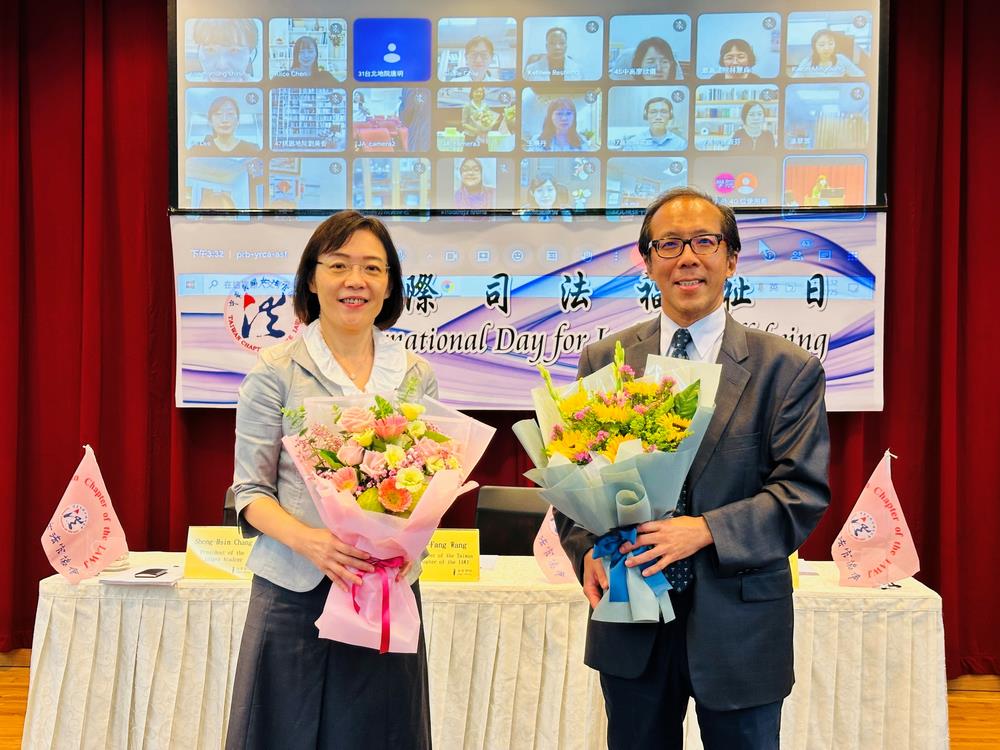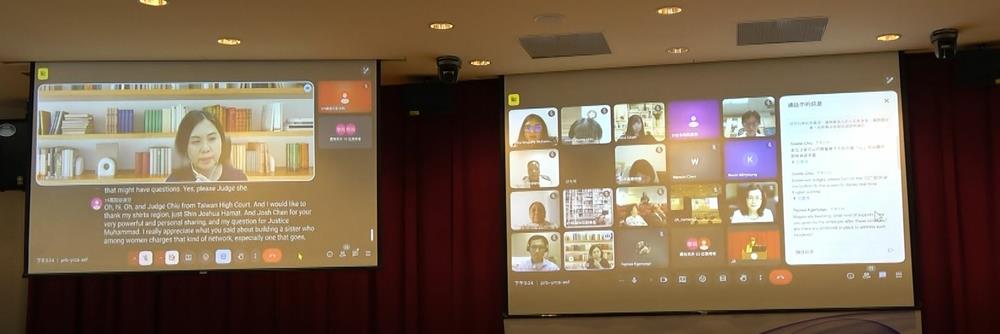Global Judiciary Observes First UN-Recognized International Judicial Well-being Day
Webinar highlights global challenges, local reform, and a shared commitment to judicial wellness
Liling Lee, Webinar Moderator, Presiding Judge of the Family Division, Taipei District Court, Chinese Taipei
Taipei, July 25, 2025 — In celebration of the first International Judicial Well-being Day, over 70 judges and legal professionals from around the world gathered online for a pioneering bilingual webinar. Co-hosted by the Chinese Taipei Chapter of the International Association of Women Judges (IAWJ) and the Judges Academy, the event addressed the urgent and often invisible challenges judges face — from mental burnout to external threats.
The UN officially recognized July 25 as Judicial Well-being Day in 2024, following the Nauru Declaration. This year’s event united speakers and participants from Africa, Asia, and the Pacific, aiming to spotlight both global and local strategies to support judicial resilience.

Justice Pi-Fang Wang and Dr. Sheng-Hsin Chang
Opening Remarks: Unity Across Borders
The event began with remarks from three leading figures in the judiciary:
- Justice Pi-Fang Wang, President of the IAWJ Chinese Taipei Chapter and Supreme Administrative Court Justice, called for international solidarity and emphasized that judicial well-being is fundamental to preserving judicial independence.
- Justice Suk-Heui Shin, Asia-Pacific Regional Director of the IAWJ and Justice of the Supreme Court of South Korea, acknowledged the distinct pressures on female judges and emphasized the importance of inclusive voices.
- Dr. Sheng-Hsin Chang, President of the Judges Academy, highlighted Chinese Taipei’s increasing concern over mental health in the judiciary and is committed to fostering research, training, and international exchange.
Together, their messages reinforced a common theme: judicial stress is a shared experience requiring shared solutions.

Session One: International Experiences (English)
Four judges from Botswana, South Korea, the Maldives, and Chinese Taipei presented deeply personal accounts of judicial well-being:
- Magistrate Kefilwe Resheng (Botswana) discussed the emotional and physical burdens of female judges in Africa. She shared experiences of being verbally assaulted and physically threatened in court without adequate protection. Her plea: improve mental health support, reform policies, and enhance courtroom safety.
- Judge Soonyoung Shin (South Korea) described a courthouse attack by protestors after a controversial detention ruling — a case echoing similar intimidation of judges in the U.S. She stressed the need for international dialogue and legal mechanisms to protect judges and uphold judicial independence.
- Justice Aisha Shujune Muhammad (Maldives) reflected on breaking gender barriers as one of the first female judges in her country. Despite enduring discrimination and emotional strain, she noted the rise of female support networks that are reshaping judicial culture and paving the way for reform.
- Judge Ying-Cheng Chen (Chinese Taipei) shared how heavy caseloads and emotional stress silently wear down judges. Drawing from insights at the IAWJ Biennial in Cape Town, she advocated for breaking the stigma around burnout and building wellness programs that treat judges as whole persons, not just legal workers.

Session Two: Chinese Taipei's Judicial Landscape (in Mandarin)
The second half focused on Chinese Taipei’s internal struggles and search for solutions:
- Judge Hsiao-Jung Chen (High Court) gave a moving testimony: she suddenly collapsed at work due to cardiac arrest, the same day, Chinese Taipei’s judiciary held a memorial for a judge who died by suicide. Her near-death experience, revived only after emergency care, served as a grim wake-up call for the judiciary’s collective health crisis.
- Dr. Chien-Chang Wu (NTUH), a psychiatrist and expert on occupational stress, explained that judges are uniquely vulnerable due to the moral weight of their decisions, public scrutiny, and isolation. He recommended a mix of coping strategies — including mindfulness, sleep hygiene, and emotional support — and emphasized systemic reforms like workload monitoring and institutional care.
- Professor Hsiao-Tan Wang (National Chengchi University) shared key findings from her Judicial Yuan-commissioned study on judicial workload. Her research showed that over the past decade, Chinese Taipei’s case filings have grown nearly 30%, while unresolved cases more than doubled. Judges, meanwhile, remain overextended. Her 12 proposed reforms include legal simplification, digital case management, enforcing attorney representation, and relieving judges of excessive administrative duties.
Conclusion: A Global Network for Judicial Well-being
In closing, the host emphasized that judicial well-being is not an individual luxury but a systemic necessity. As judges are increasingly expected to handle more complex cases under rising social pressure, their well-being is critical to maintaining a fair and independent justice system.
The collective message was clear: to protect justice, we must also protect judges — not just from external threats, but from internal exhaustion. This inaugural observance marks the beginning of a global judicial support movement rooted in empathy, reform, and resilience.